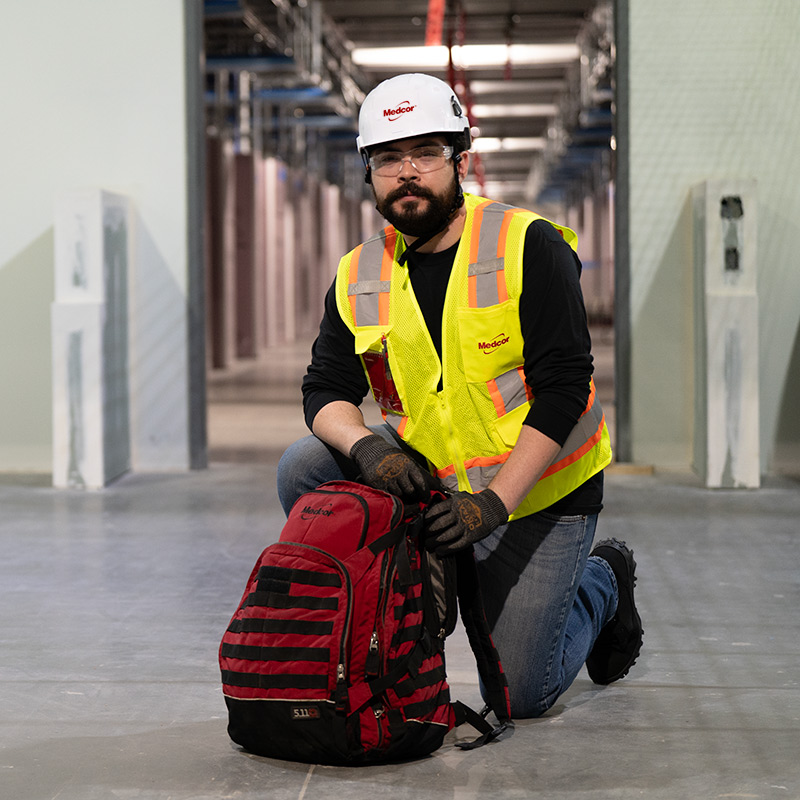Workplace Safety
The Importance of Workplace Safety
A safe and healthy workforce is a productive workforce. Having clear, comprehensive safety programs and guidelines in place is the best way to prevent injuries and accidents, minimize downtime and ensure compliance with regulations. Medcor can help ensure workplace safety.

Fostering Health and Safety in the Workplace
As an employer, one of your duties is to provide a safe working environment for your most valuable resource: your employees. A safe work environment promotes productivity while helping to prevent workplace injuries, accidents, illnesses – and even deaths. Not only will this save you time and money in the long run, but just as crucially, it will demonstrate to your employees that their health and safety is a priority to you.
Medcor’s workplace safety solutions can be customized to provide time-tested, real-world safety programs across a wide range of working conditions. Our health and safety strategies help employers stay compliant with OSHA (Occupational Safety and Health Administration) and other regulations while identifying and addressing unsafe conditions. From offering workplace safety best practices to implementing safe working environments, Medcor’s employee health and safety solutions are built to accommodate the unique needs of your organization.
Workplace Safety Tips Your Employees Should Know
In addition to providing a safe and healthy workplace, it is the employer’s responsibility to make sure that your employees are aware of the property safety procedures. Here are a few tips that you can share with your employees.
- Be aware of your surroundings
- Report any hazards or unsafe conditions
- Take regular breaks
- Maintain proper posture
- Know where emergency exits, fire extinguishers and first aid kids are located
- Always wear personal protective equipment (PPE)
- Follow workplace safety and health procedures
Try our free safety staffing calculator for an instant quote.
Looking for an experienced safety professional for your project?
Medcor’s Workplace Safety Services

-
Through Medcor Safety, we offer staffing solutions, including direct hire, interim and temp-to-hire.
-
Seeking to update your safety standards or create new ones? Our audits and inspections help you get the most out of your programs.
-
Our experienced consultants help you get a better grasp on safety requirements and recognize your site’s existing workplace hazards.
-
Deploy a team of highly experienced instructors—active emergency responders with 20+ years of real-world expertise—for training that prepares your workforce to act. Our dual-instructor classes are tailored to your site, meet local and state regulations, and are especially effective for organizations with in-house Emergency Response Teams. Training disciplines include Confined Space Rescue, Fall Protection, Ammonia Emergency Responder and OSHA 30.
-
Custom safety programs that go above and beyond with add-ons like emergency response team training, safety consultations, orientations and more.
Maximize Your ROI with Medcor’s Workplace Safety Solutions


What to Look for in Workplace Safety Providers
Some things to look for include:
-
Your workplace safety team will offer practical solutions for preventing workplace accidents that take into account your unique workplace needs.
-
Frequent monitoring and assessment of your workplace and its hazards is essential to mitigate risks that lead to workplace accidents.
-
Whether onsite or virtual, the right workplace safety provider will offer comprehensive health and safety training that complies with all regulations and requirements.
-
Your safety team should offer identification, assessment and prioritization of your existing workplace safety risks.
-
The right workplace safety team knows and understands federal, state and local requirements and can help you build a safety plan and program to comply with them.
It takes more than ensuring procedures are in place. They also need to be followed in order to avoid workplace injuries that can lead to extreme financial penalties. Medcor equips your employees with the proper emergency procedures and follows through with training and consulting to maximize your ROI.



